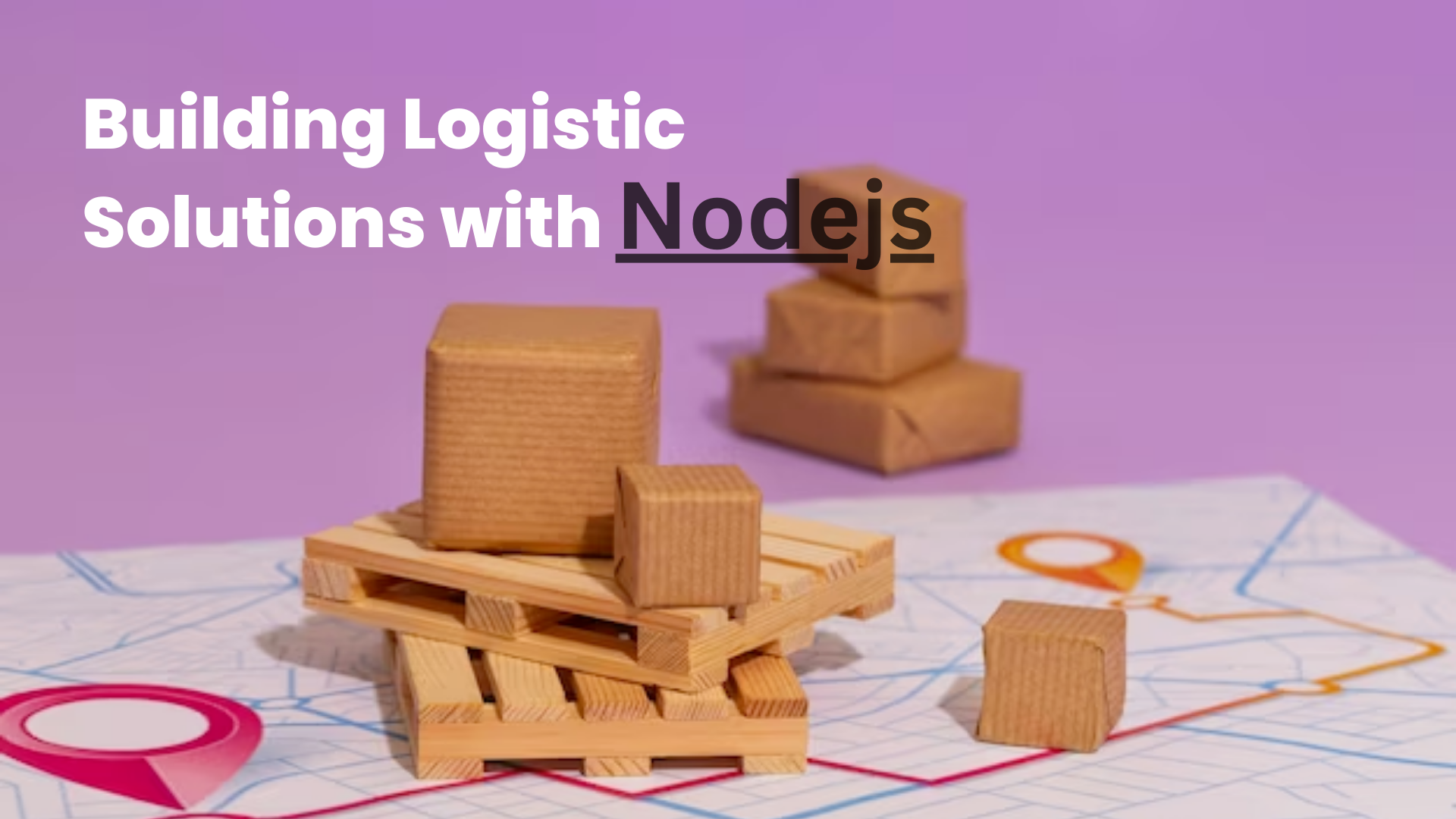In an era where everything is attainable at an astonishing velocity, logistic services are continuously evolving to become increasingly agile and expeditious with each passing day. Where efficient and reliable solutions are paramount, Node.js frameworks have emerged as indispensable tools for building real-time web applications. The logistics industry is vital in ensuring goods reach their destination swiftly and seamlessly, enabling businesses to thrive. With logistics being the backbone of successful transactions, it encompasses the movement of goods and services, ultimately driving profits. In today’s era of instant gratification, customers demand quick and convenient services, fueling the exponential growth of on-demand apps.
As the on-demand economy expands, the need for real-time functionality becomes increasingly crucial, and this is where Node.js shines. With its asynchronous and event-driven architecture, Node.js offers unparalleled responsiveness, making it the go-to choice for developing real-time web applications. Whether handling a high volume of concurrent users or ensuring prompt responses to user requests, Node.js delivers exceptional performance. Join us as we delve deeper into the reasons why Node.js has become the preferred technology for building cutting-edge real-time logistic solutions. And if you’re looking to bring your logistics project to life, consider to hire dedicated developers well-versed in Node.js for a seamless and efficient development journey.
Let us begin with understanding the real challenges that every logistic system needs to confront.
Challenges in Providing Reliable Logistics
The Complexities of Data Management
The digitization of the logistics industry brings with it the challenge of effective data management. Accessing and utilizing data for informed decision-making can be hindered by data silos within an organization, preventing a comprehensive view of operations. Shipping manifests, tracking information, and customer data are just a few examples of the vast amount of data that needs to be managed accurately. Integrating this data into multiple systems, such as accounting, warehouse management, and customer relationship management, further adds to the complexity. To navigate this challenge successfully, gathering essential information and seeking guidance from industry experts becomes crucial for logistics companies embarking on the path of digitization.
The Need for Adaptive Flexibility
Flexibility is an essential aspect of logistics digitalization due to the dynamic nature of the industry. Logistics providers must adapt swiftly to changing conditions, such as weather, traffic, and customer demand, as well as capitalize on emerging opportunities like same-day delivery. However, many digitalization efforts have focused primarily on automation, which can result in inflexible systems unable to adjust to new circumstances promptly. Striking the right balance between automation and flexibility is imperative to ensure agility and resilience within logistics operations. Finding the optimal blend will enable companies to navigate changes efficiently while avoiding disruptions and delays.
Overcoming Implementation
Challenges Implementing logistics digitalization is a formidable task that requires substantial investment in resources, including finances, time, and personnel. It necessitates a fundamental shift in mindset and corporate culture, embracing experimentation and adopting new technologies. Although many companies have begun their digital transformation journey, logistics presents its own complexities and challenges. Integrating new technologies requires careful consideration of various factors, including compatibility with existing systems and the potential need for adjustments to accommodate the chosen technology effectively.
Ensuring Data Security
The collection and storage of data in a digitalized logistics environment raise concerns regarding data security. Logistics companies heavily rely on data to track shipments, optimize routes, and manage inventory. However, this data often contains sensitive information, such as credit card numbers and addresses, making it a prime target for cybercriminals. Protecting this data becomes paramount, requiring robust security measures such as encryption and multi-factor authentication. Furthermore, educating employees on cybersecurity best practices is crucial. Despite these efforts, the risk of data breaches remains a significant concern for the logistics industry.
Node.js: Disrupting Logistics with Unmatched Efficiency
Node.js, an open-source JavaScript environment for server-side development, has emerged as a game-changer in the world of logistics. Since its introduction in 2009, Node.js has gained widespread popularity due to its exceptional speed and efficiency. Powered by the V8 JavaScript engine and leveraging the core of Google’s Chrome browser, Node.js operates within a single thread without creating new threads for each request. Its standard library is equipped with asynchronous commands, enabling non-blocking paradigms. As a result, Node.js proves to be a perfect fit for real-time applications and delivers remarkable performance across various industry use cases.
1. Role of Node.js in Real-Time Apps and Seamless Data Management
In real-time applications, Node.js performs crucial roles, including collecting and utilizing user data in real time, generating dynamic content for users, managing and rectifying data across databases, and executing server-side code seamlessly. With its ability to handle real-time data and provide dynamic experiences, Node.js empowers logistics applications to deliver efficient and responsive solutions.
2. Global Companies Trusting Node.js
Leading global brands, such as eBay, Walmart, Uber, PayPal, GoDaddy and Netflix have placed their trust in Node.js development companies for their operations and ongoing support. This testament to Node.js’ reliability and effectiveness underscores its significance in the logistics industry and beyond.
3. Advantages of Node.js in Real-Time Application Development
Node.js offers numerous benefits for developing real-time applications:
- Event-Based Server: Node.js leverages an event-driven server architecture, enabling non-blocking functionality and efficient handling of real-time users and events.
- Data Synchronization: With its non-blocking I/O feature, Node.js facilitates fast and seamless data transmission between the server and client.
- Scalability and Speed: Being JavaScript-based, Node.js ensures fast application performance. Its single-threaded model and event loop enable handling multiple client requests with ease.
- Code Sharing and Reusability: Node.js supports the microservice architecture, allowing developers to reuse library code packages across multiple projects, enhancing productivity and saving time.
- SEO Friendliness: Incorporating Node.js in the app development stack improves SEO rankings by enabling backend rendering, enhancing user experience, and increasing visibility.
- Proxy Server Capability: Node.js serves as an ideal choice for proxy servers, simplifying the streaming of data from various sources with just a few lines of code.
In the logistics industry, where speed, scalability, and real-time capabilities are crucial, Node.js has proven to be a transformative technology. Its event-driven architecture, non-blocking I/O, and code-sharing advantages make it an indispensable tool for developing efficient and responsive logistics solutions. When you hire nodejs developers they would harness the full potential of Nodejs as they possess expertise in leveraging this powerful technology for your logistics project.
Why Node.js is the Ideal Backend for Reliable Logistics and Transportation Apps

Node.js, with its impressive array of features, is a powerful choice for building robust and dependable logistics and transportation applications. Let’s explore the remarkable features of Node.js that make it an ideal backend solution for this industry.
Integrate with Third-Party APIs and Build RESTful API
If you are looking to build logistics and transportation apps, we recommend Node.js as it has the power to integrate with third-party APIS in a seamless manner. There are an array of external services exposed in front of developers through which they can efficiently exchange data and can enhance the functionality of the apps. In addition, Node.js supports RESTful APIs that give access to developers to create structured and scalable backend architecture and can provide seamless communication between various components of the application. Moreover, this feature of Node.js can also seamlessly integrate with other systems as well.
Developing Real-Time Shipping and Tracking Systems
For every logistics industry, delivering real-time capabilities is crucial and of utmost priority. You need to provide timely information to the users and Node.js can handle the high demands of real-time shipping and tracking systems. This feature helps developers to build highly responsive apps due to its event-driven and non-blocking I/O architecture. The users get instant updates on package status and can track the estimated delivery times and location. Every logistics company and customer needs real-time information that is up-to-the-minute with a high level of accuracy and improved visibility. With Node.js companies can ensure utmost customer satisfaction to their end users.
Building Data Synchronization Mechanisms
One of the most critical aspects of every logistic and transportation app is handling massive data. Coming to Node.js, this feature can synchronize huge amounts of data, can manage and update information across multiple databases and systems. The blocking I/O model and event-driven nature help developers to build efficient data synchronization mechanisms. Moreover, Node.js has asynchronous capabilities that is available at various systems and with the stakeholders. Looking at the ultimate goal of every logistic set-up is to provide data accuracy, eliminate inconsistency and streamline the whole logistics process, and only Node.js can make it possible in the most efficient manner.
Leveraging Machine Learning and AI
With Node.js, not only scalability and real-time capabilities are possible, but the framework provides an additional feature to integrate the ML and AI algorithms into the logistics and transportation apps. The framework leverages the power of intelligent algorithms and helps developers to optimize routes, detect anomalies, predict demand and provide advanced analytics. The most unique event-driven architecture helps ML models to integrate with other systems and produce real-time data and also gives actionable insights for logistics companies. Hence, every business can optimize its operations, create data-driven decisions and can amplify the overall business efficiency.
Implementing Scalable Microservices Architecture
Node.js provides a rich database of multiple Java Script modules that can simplify the application development with high scalability. Developers and software architects prefer Node.js as the server provides non-blocking mechanisms to respond, and can execute codes swiftly with no data buffering. Also, its asynchronous libraries can be moved to API without waiting to return data of the previous API. The feature enables the breaking down of the application into modular and independent services, helping developers to achieve higher flexibility and perform with agility. Hence, each microservice architecture can be developed, deployed and can be scaled independently. Overall, by implementing a scalable microservices architecture, developers can perform seamless communication between services and can assure optimal performance.
Use Popular Node.js Packages for Logistics, such as Express and Socket.IO
Node.js contains a rich ecosystem offering varied frameworks and packages that can be customized as the needs of logistics and transportation companies. With some of the best frameworks like Express.io, developers can create robust APIs with the best tools and middleware. With this framework, every endpoint is created seamlessly, handling requests and routing, with a considerable reduction in development timing. In addition, with Socket.io, real-time communication is possible between client and server leading to real-time updates and enabling robust interactive ecosystem. The developers can speed up the development cycle, enhancing functionality and can provide value-added logistics and transportation applications.
Enhancing Security and Authentication
Managing and providing security is one of the biggest concerns for every logistics industry. There is a lot of sensitive information and a high amount of transactions that are involved here. With this unique Node.js feature, the apps are supported with high integration of authentication mechanisms. The apps are encrypted, with secured communication protocols and have several authentication layers to protect data integrity and user privacy. The framework provides robust security capabilities that ensure the apps work according to the security standards, enabling trust and confidence amongst the users.
Scalability and Performance
The framework has an inherent feature to provide scalable and highly performant logistics applications. Handling multiple connections with high efficiency can only come because of its single-threaded and event-driven architecture. During the peak of the traffic sessions, the application maintains high responsiveness and can deliver excellent user experiences. With its non-blocking I/O operations that provide asynchronous processing, the applications can handle several requests at a time without hampering other tasks. Hence, logistics companies can handle high volumes of data and accommodate increasing user demands.
Data Handling and Storage
The industry of logistics and transportation needs to deal with vast amounts of data that majorly include shipment details, inventory records, tracking information and user data. With Node.js, the apps get remarkable support for data handling and storing, and developers can easily manage and manipulate complex data structures with the best efficiency. Moreover, there are robust libraries and modules that helps the apps to simplify all kinds of data operations. Every data-driven task is performed seamlessly and simultaneously the apps are equally responsive and efficient.
Final Thoughts
Node.js has proven to be a game-changer in the logistics industry, disrupting the way logistics and transportation apps are developed and operated. Throughout this article, we have explored the key features of Node.js that make it the preferred choice for building reliable logistic solutions. We have seen how Node.js enables seamless integration with third-party APIs, facilitates real-time functionality for shipping and tracking systems, and provides robust data synchronization mechanisms. Additionally, Node.js empowers logistics companies to leverage machine learning and AI, implement scalable microservices architecture, enhance security and authentication, and efficiently handle and store data. The benefits of using Node.js for logistics projects are undeniable – improved performance, scalability, and data handling capabilities, which result in enhanced efficiency, optimized operations, and superior user experiences. To build are reliable and highly efficient logistics project, you need trusted and expert Node.js development services. With a Nodejs expert having the back of your business, you can create robust and reliable logistic solutions that meet the demands of the industry and propel your business to new heights of success.
Also Read:
Author

Sunil is a result-orientated Chief Technology Officer with over a decade of deep technical experience delivering solutions to startups, entrepreneurs, and enterprises across the globe. Have led large-scale projects in mobile and web applications using technologies such as React Native, Flutter, Laravel, MEAN and MERN stack development.
View all posts









